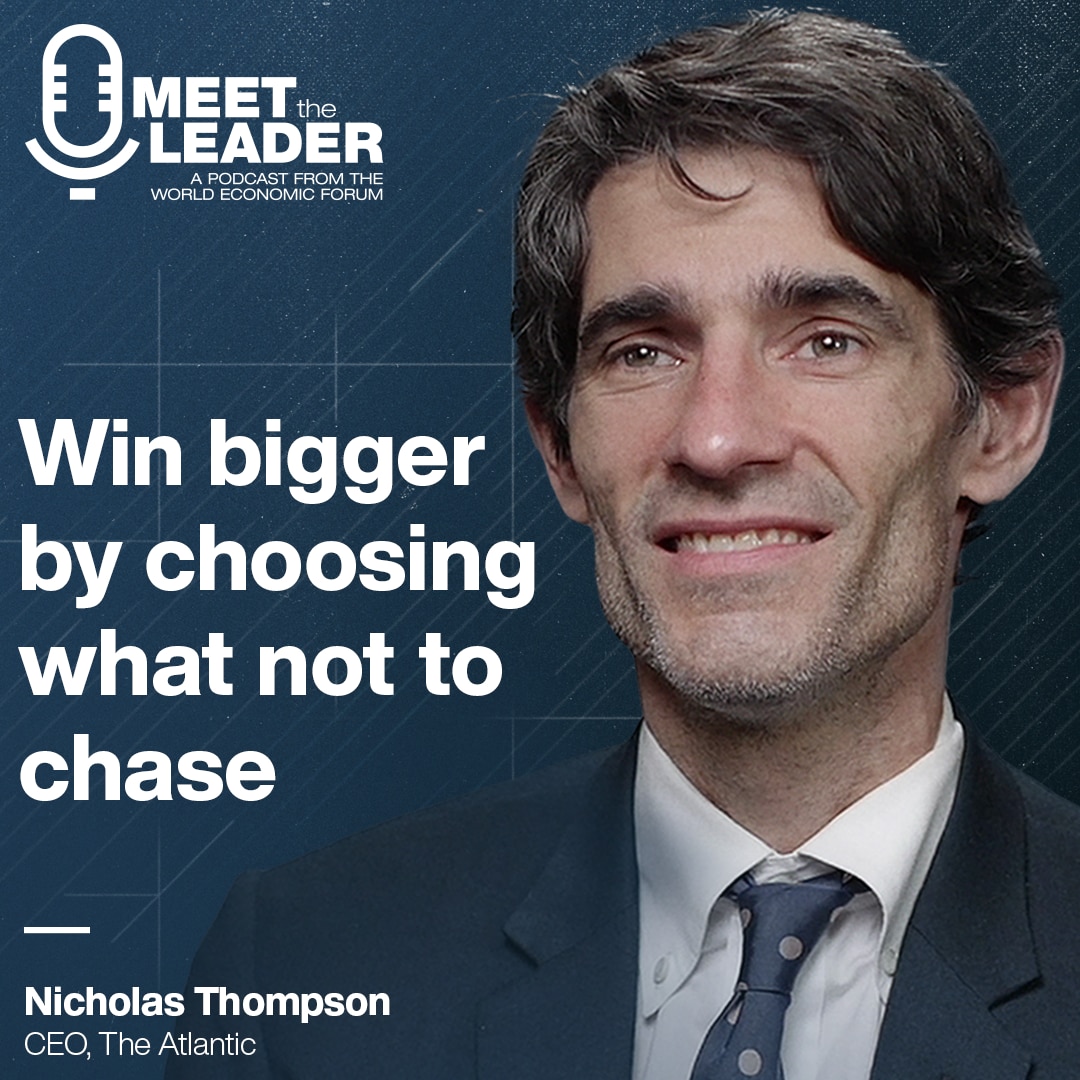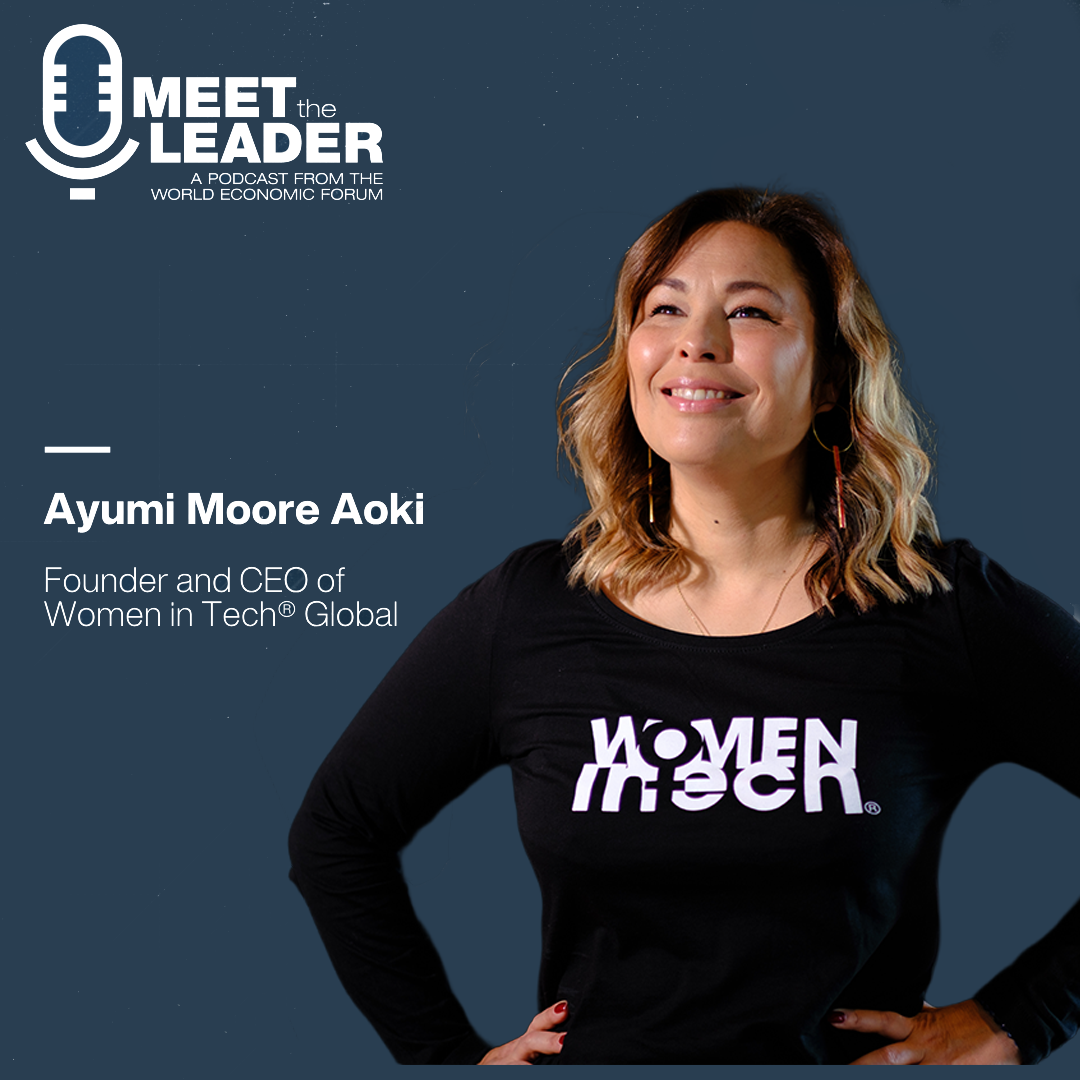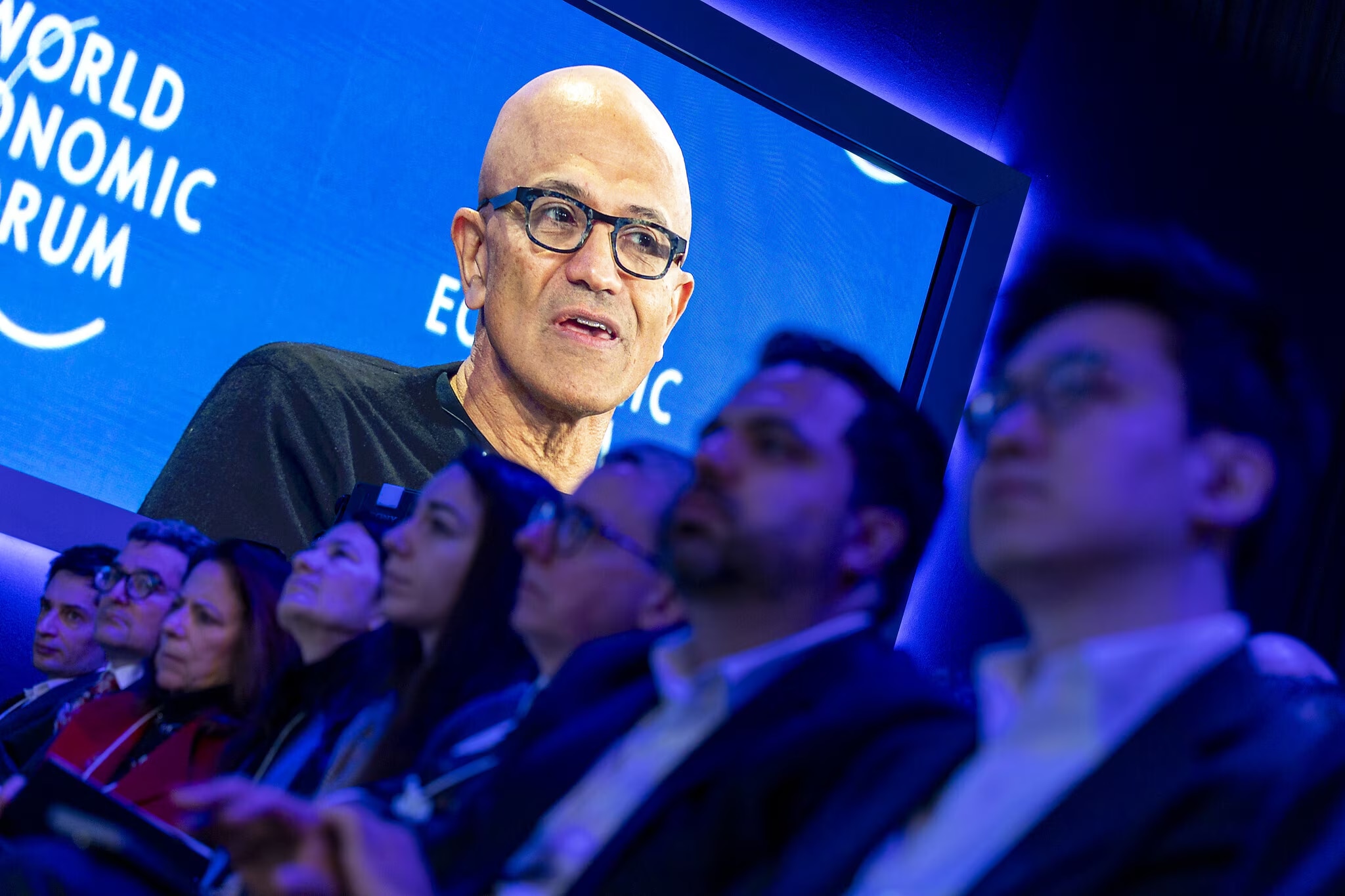This former astronaut shares what’s key to building strong, effective teams
播客文字稿
Linda Lacina, Meet The Leader Welcome to Meet the Leader, the podcast where top leaders share how they're tackling the world's biggest challenges.
In today's episode, we talk to an astronaut about the qualities that all effective teams share and what's really needed to build trust that lasts.
Subscribe to Meet the Leader on Apple, Spotify, and wherever you get your favorite podcasts. And don't forget to rate and review us. I'm Linda Lacina from the World Economic Forum and this is Meet the Leader.
Soichi Noguchi One way we learn teamwork is through survival training. Just like in space, if you go to survival training, you have to expect the unexpected. We cope with the changes, we cope with the nature, and then step-by-step we know about ourselves, we know about our teammates and we know how to cooperate.
Linda Lacina, Meet The Leader When leaders usually talk about building trust, it's usually in the abstract. Too many of us deal with emails and PowerPoints. Missing a deadline might be disappointing, but it's hardly a life-or-death situation.
But most of us aren't astronauts. Those working on space exploration and research understand teamwork at a different level. This is a world of detail, training and expertise where team members really do hold each other's lives in their hands.
Dr. Soichi Noguchi is an astronaut and aeronautical engineer who has flown to space not once, but three times. He'll talk about the unique training these teams undergo to build teamwork, and what anyone can learn from how that trust is forged.
And he’ll also share what he’s been focused on after nearly 30 years as an years as an astronaut. He’s served in a number of roles – as a Professor for institutions like the University of Tokyo, as an executive fellow for the Institute for International Socio-Economic Studies and he currnetly serves as an advisory board member to space infrastructure company voyager space, a firm working on the Starlab commercial space station.
He’ll share why it’s so key to keep driving home how space can help us better live on earth and how it can help us even tackle the biggest problem of our time, climate change. We’ll get into all of that - but first, he’ll talk about his time as an astronaut.
您读了吗?
These 6 countries are using space technology to build their digital capabilities. Here’s how
Japan lands spacecraft on the moon, and other technology stories you need to read
Can space tech save the planet? Astronaut Matthias Maurer joins Al Gore and other experts from space
5 ways space tech can help protect the planet
Soichi Noguchi I became astronaut in 1996, 28 years ago, and that was the time when we -- we means United States, Russia, European Union, Japan and Canada, five partners -- worked together to build the International Space Station. And that was the time we go to space and build the space station in zero gravity. That was a tough job. Lasted about five years. So my first mission was to bring the new model or the module to space and help build the station bigger and bigger.
My second mission, however, we completed construction, meaning the International Space Station is full force. Did a lot of zero gravity science. 24/7 we did a lot of a science experiment. Could be a pure physics experiment. It could be a bio material experiment. Sometimes it's space education.
So those things we do along with the other six astronauts. So we have seven of us living for the period of six months. So each of us do maybe like 100 different subjects. Most of them come from the senior professors and the researcher on the ground. So we only do this portion of it because the major part is down on the ground. But we are happy to work with researchers on the ground to make a lot of interesting experiments in space.
Linda Lacina, Meet The Leader There's incredible preparations, of course, but still, I'm sure that there are things that surprised you. What surprised you about any of these experiences?
Soichi Noguchi I really like this quote: "Expect the unexpected."
So in space, there's always something that you cannot predict or expect while we are planning on the ground, partially because it's zero gravity issue, things does not behave like the way on the ground.
I remember that one of the plant growth experiment that we bring the plant, we bring the soil along with the nutrition and we grew over the period of a few months. And most of the time they grew pretty well. The plant grew in zero gravity as well as long as we have a good light and the good nutrition and good water.
But one of the test pods did not work because there is a fungus inside, and when we bring those seeds to space, we do a thorough inspection. We did a lot of good cleaning and make sure we don't bring any extra territorial stuff into the space station. So most of the time it is super clean, except you cannot take everything out of a seed, because sometimes the seed itself has some fungi inside. Only one of them out of, I would say like out of 20, just one of them basically did not work with the fungus inside. So yeah, things can happen.
Linda Lacina, Meet The Leader How did that experience -- sort of like helping to build the International Space Station -- how did that change you?
Soichi Noguchi Well, in many ways. First of all, as I earlier mentioned, most of the science projects are a joint work with the professors and the researchers on the ground, and we do only the small portion. The teamwork plays a major role, so we would not do any science activities alone. We are working closely together with the ground team. And I am only a small portion of the big team. And so the team work is very important and the leadership and the followership.
People tend to think astronauts play a major leadership role. In reality, we take turns. Sometimes the ground control takes the lead and we only follow whatever they think is the right thing. And we will not just blindly follow the instruction, we will actively criticize, but still work as a follower, but still contribute to the success of the team.
Linda Lacina, Meet The Leader Astronauts have an incredible sense of teamwork. I wanted to know what in the training sort of helps contribute to that. I imagine a lot of people listening would kind of like to know what those ingredients are, that special sauce, so that maybe they could find what works for them. But what do you think in the training and the preparation helps make astronauts like sort of super teamers.
Dr. Soichi Noguchi Some people are born with good sense of teamwork, but even if you aren't, you can learn how to be a good player. And the one of the way we teach or one way we learn teamwork is through survival training. And we spend one week together as a crew. Crew, meaning the people riding in that space capsule together.
For instance, for the SpaceXCrew Dragon, there are four of us. And the space shuttle in the United States used to be seven of us. Anyway, those small numbers, we traveled together a lot and sometimes we go to the mountain area, spend a week, and then we just learn, just like in space, if you go to survival training, you have to expect unexpected. We cope with the changes, we cope with the nature, and then, step-by-step, we know about ourselves, we know about our teammates and we know how to cooperate. So that's the way we learn teamwork.
We cope with the changes, we cope with the nature, and then, step-by-step, we know about ourselves, we know about our teammates and we know how to cooperate.
”And having said that, you know this one week in Davos, Switzerland, this Forum is almost like survival training for the CEOs. Most of the time they have their important job, they are all VIPs, their they are very busy with their own business, but they secure one week on their very busy schedule, come to this isolated ski resort, spend a one week together, and we just come across so many people who you don't know, But all of them have a great expertise and great visions. So we learn from them. And to me, this is more like a survival training for the CEOs. And it plays a major role - how to learn good teamwork.
Linda Lacina, Meet The Leader When you were in the survival training, when you maybe would go into the the wilderness, what would be a typical day and the type of challenges you guys would have to work together to solve?
Dr. Soichi Noguchi We usually go to a very isolated area. I've been to the survival trading, I would say 4 or 5 times in my career.
One of them, we go into the caves of one of the small islands in Italy. We dive into the caves and there are underground lakes. There's an underwater river. We actually do the mountaineering in the caves. So it's very much like exploring Mars or Moon. And then, again, that's about the length of two weeks we are under the ground in the caves. There's no sunlight -- which kind of mimics the life in the space station. We cannot rely on sunlight to know the time. The key thing is you are isolated. Then you have to cooperate together to survive.
The key thing is you are isolated. Then you have to cooperate together to survive.
”
Another extreme is we spend also a couple of weeks under the sea. Happens in Florida coast, United States. And the University of Florida has an underwater base. So we have a contract with them, and they use the facility for like two weeks. And we go down using the divers, scuba diving, going down like 60ft. It is also an isolated area. This time we have sunshine. But the tough thing is, if you don't use the equipment properly, meaning, scuba gear or the pressure lines, you will put your life to risk. It's not an easy environment to live with. Yeah, the water itself is seems friendly, but if you are under 60ft underwater, the water pressure is pretty high. You have to be really careful of getting out and into the capsule.
So those kind of things, you know, if you will deal with extreme environment, it could be the caves, it could be the underwater. You need to pace yourself and you need to know the environment and adjust to the environment. So those things we learned through the survival training.
Linda Lacina, Meet The Leader In survival training and also in space sometimes, as you mentioned, there's things that you just can't predict that will happen. Little moments that come up. And unlike on Earth, maybe if we had a smaller challenge, your email doesn't work or something, you can close your laptop and go away and come back. Right? But in in space or, you know, in the caves or whatever, you need to deal with it, right then. What did that teach you about problem solving that all of us can learn from?
Dr. Soichi Noguchi Yeah, you're absolutely right. You know, the things happen, as always. Sometimes you can just walk away with it. In space or extreme environments, sometimes you cannot walk away. So, you have to come up with the solutions.
The long periods of training -- you cannot cover every single situation. So sometimes we have to decide what to do among, we're discussing among ourselves and decide what to do. And that things exactly happened on my last mission.
We play as a team. We have a leader, we have a follower, and each of us has its own expertise.
”And the important thing is we play as a team. We have a leader, we have a follower, and each of us has its own expertise. Every single one have to contribute to the success, meaning contribute to the safety or survival of the crew, otherwise we all die.
We have to make sure that our vector lines up to the goal. All four of us facing the same goal. That's the first thing. And on that limited environment, you cannot have a 100% solution. Everything has to be compromised. So, it's a matter of the compromise. So what you can lose and what you cannot.
So we have to draw the line. You can compromise to the extent that the main goal, in this case survival of the full crew, so you have to get rid of other minor issue. Don't worry about like comfort. Don't worry about the extra success or don't worry about the pristine condition. But the most important thing is the survival. So all members have to line up to the one goal. Then we can survive.
Every single one has to contribute to the success, meaning contribute to the safety or survival of the crew, otherwise we all die.
”Linda Lacina, Meet The Leader You mentioned earlier that it is possible to learn how to team better. What would you suggest, even for folks who feel like, "hey, I'm pretty good. I'm a pretty good teammate, right?" You know, how can they get even a little better? Some, practical things people can either think about, or actually put in practice.
Soichi Noguchi Yeah. That's good. Actually, it's funny that for, like, Japanese, we are usually very quiet. Modest. Many Japanese thinks, oh, I'm not good at, you know, teamwork. I'm so, helpless. And the on the other extreme, some people think, "yeah, yeah, we can do any work. So, yeah, teamwork is a piece of cake." So it's a lot of a different spectrum.
And the for, like, for my case, I can more understand what the other Japanese say: "I cannot work with teamwork because I don't have good confidence on myself, and I don't have a good expertise."
You have to know what you can do. You can what you can contribute to the success of the team.
”
What I try to teach, especially for the young generation, is that this teamwork, definitely you can learn from it. And the way you learn, you can do various things. For instance, like sport, you know, the teamwork, team sport, you know, you can do soccer, you can do volleyball, you can do basketball. That's the one way that the goal is very simple, you know, to win a match. But then you have to know your own team member and you have to know what you can do. You can what you can contribute to the success of the team. And you have to know the enemy.
Also, for when you're working in the company, usually you form a small team. It could be project team. It could be a like a permanent division of -- for like a research. It's the same thing. There is a leader, there's a team and there's a goal. So, then you have to contribute yourself to the success. And most of the time, the key to success is a good communication. So make sure you understand what the leader is aiming and the how to make yourself understood what you can do and how you can contribute.
And again, just like, the issue in the space of compromise could be the same factor. It's not the bad thing to compromise as long as you understand the final goal and you understand what you can give up to get the final goal right.
Linda Lacina, Meet The Leader You mentioned that, hey, you know, even on a sport team, everyone has a specialty. Everyone has a special role. What would you recommend? Just occurs to me, as you're talking, that maybe another test for someone is to ask themselves what every single person in their group contributes. And also, you know, how can I help those other people do a really good job in their role? Would those be good questions also to help you kind of reset, if you were kind of thinking like, how do I get back a team mentality as opposed to a saviour mentality.
Dr. Soichi Noguchi That's a good point about, you know, the learning and the team work to make sure there's a good flow of the communication that you understand the team member can do and how we can manage to work together.
Sometimes on the first day definitely it is hard to work together. Each one of us has our own ego for sure. As long as all members are facing to the toward the same goal. Eventually, the team was starting to movem starting to gear up and to move, and each small ego slowly diminishes as a team becomes really crystallized.
But again, you have to show the rest of the member what you can do, and you have to understand what the other members can do and what's the kind of like a meeting point.
Linda Lacina, Meet The Leader You talked earlier about the work that you're doing at the university. What something that maybe people don't understand about the opportunity that we have to leverage space to leverage the data that we can get while we are in space. What's something people don't understand?.
Dr. Soichi Noguchi Yeah. Good question. Actually, you know, obviously I was an astronaut. I love space and, you know, the going to the space and use the space environment is, no brainer for me for a long time.
But after I retired from NASA, come to university, I have to explain to the rest of the people or the rest of the world what's good with the space technology. And I'll try to explain in a couple of ways.
One, space technology is not for space itself. You know, space technology -- we can use this to solve the issue on the ground. So the space is for you who live on the ground.
For instance, location providing technology, GPS, started off with the space technology, it's purely military technology, to start off with. And so that, you know, the soldiers in the aircraft, know exact location of the enemy and me and what's the solution. And guess what? Almost every single car has GPSs, and almost every single cell phone has a GPS so that you know where to go. That's really started off with space technology. Now it's everyday life.
And now it's the internet. Everybody loves internet. Of course, it comes through the ground line. The optic fibre also plays a major role. But you know, there's like SpaceX they launched a constellation of a small satellites called Starlink, and then you can have the internet, the connection to the satellite, even if you're living in an isolated area, you can enjoy the streaming video, you can talk to your friend, and, you can get the latest information. And those are the things that the space technology definitely helps our daily life.
And the second thing is, now we have a lot of a new players compared to like 20, 30 years ago. They used to be only the small elite companies doing the space, established space. Now we have a lot of newcomers in IT, tech and also the new ventures, coming into the field. Even if you are living in isolated countries or don't have any space industries you don't have to worry about it. It's much easier to get into this space economy and get into the job, the study you do, like at high school or university, wherever you are, you can use your knowledge to the latest space technology.
Linda Lacina, Meet The Leader What is the one thing that you would like leaders to prioritize this year?
Dr Soichi Noguchi Well, the space is quickly changing and we are doing a pretty good job inspiring the young generation. And one thing I have to make sure that, you know, just like on the ground, space has to be sustainable. And on the ground we have climate issues. In space we have lot of new, small satellites. So, we are starting to worry about the space debris conjunction. Maybe this is a good time for WEF to get the wakeup call or the warning call to the rest of the world. "Hey. Yeah, we are using a lot of space assets. Now we have to think about controlling, mitigating the collision and discuss those new items."
Linda Lacina, Meet The Leader That was Soichi Noguchi. Thanks so much to him. And thanks so much to you for listening.
This episode of Meet the Leader was produced and presented by me with Jere Johansson and Taz Kelleher as editor, Juan Toran as studio engineer in Davos and Gareth Nolan driving studio production.
That's it for now. I'm Linda Lacina from the World Economic Forum. Have a great day.
Soichi Noguchi is a former astronaut with the Japanese space agency JAXA who has flown to space not once but 3 times. He’ll talk about the unique training these astronauts undergo - and the special lessons these trainings can teach any team about tapping each individual's expertise and what's needed to be a great leader and a great follower. He has since worked in a number of capacities, including as a professor at the University of Tokyo and an executive fellow at the Institute for International Socio-Economic Studies. He’ll share what he’s focused on now - and how space can help us better live on Earth.
话题:
第四次工业革命分享:
更多集:
每周 议程
每周为您呈现推动全球议程的紧要问题(英文)








